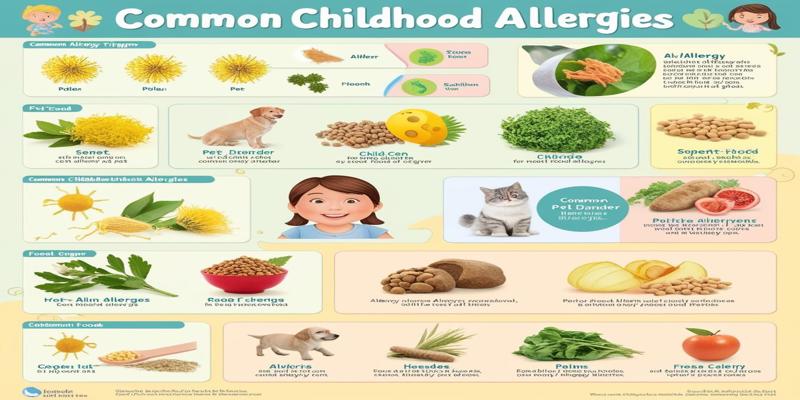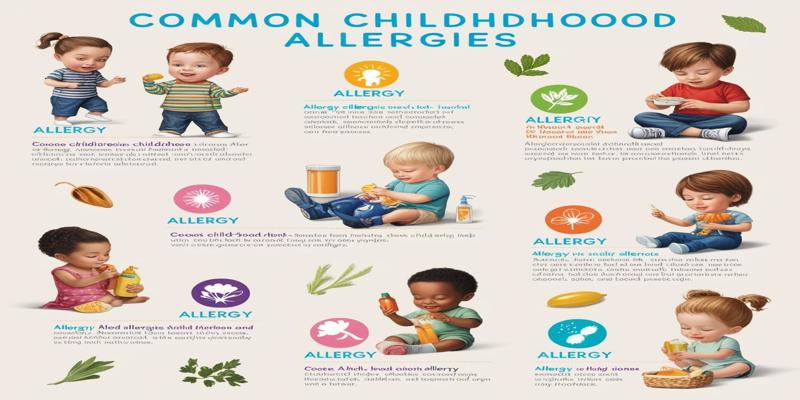Advertisement
As a parent, you are always on high alert for anything affecting your child's health and wellbeing. Allergies are a common concern, with up to 40% of children suffering some allergic reaction. Understanding the most common allergens and recognizing symptoms early helps to protect your little one and seek proper treatment.

Being aware of the most common allergies that affect children is essential as a parent. An allergic reaction usually occurs when a child's immune system overreacts against harmless substances. These reactions can be anything from mild, causing discomfort, to life-threatening, and must be appropriately recognized and managed.
Food allergies are among the most common allergies in children. The "Big Eight" allergens are milk, eggs, peanuts, tree nuts, fish, shellfish, soy, and wheat. These foods are responsible for approximately 90 percent of all food allergies in children. Symptoms range from hives and swelling to life-threatening reactions, such as anaphylaxis.
Another type of allergy or concern involves environmental allergies called hay fever or allergic rhinitis. These may be due to:
Symptoms might include sneezing, runny nose, itchy eyes, and congestion. Allergies like these are usually not dangerous but can considerably impact a child's life and academic performance.
Skin Allergy Skin allergies, including eczema (atopic dermatitis) and contact dermatitis, are also common in children. Eczema makes the skin dry, itchy and inflamed. At the same time, contact dermatitis occurs when the skin reacts after touching an irritant or allergen. Common culprits include certain fabrics, soaps, and so on.
Knowing common allergens that may affect your child is essential as a parent. Awareness of the potential causes will assist in recognizing and treating allergic reactions appropriately.
The most common allergy that children experience is a food allergy. The "Big Eight" food allergens are responsible for about 90% of all food allergies:
Although any food has the potential to trigger an allergic reaction, these are the most common culprits. Remember, too, that some children outgrow specific food allergies (especially those related to milk, eggs, and soy).
In addition to food, your child may also be reactive to various environmental causes. The following are some common ecological allergens:
These allergens can cause symptoms like sneezing, runny nose, itchy eyes, and, in some cases, asthma attacks. Seasonal allergies, often called hay fever, are usually due to pollen and can be exceptionally irritating during certain times of the year.
Less common but equally serious are severe allergic reactions to insect stings or bites. The most common culprits include:
Reactions to these can range from local swelling to life-threatening anaphylaxis. If your child is allergic to insect bites, seeking advice from an allergist for proper management and treatment options is essential.

Recognizing allergy symptoms in children is often challenging due to their closeness to common childhood ailments. However, being aware of the signs can help you get timely medical attention and provide relief to your little one. Here are some key indicators to watch out for:
Allergic reactions in children are widespread and often manifest physically. You might notice your child has a red, itchy rash or hives on the skin surface. In some cases, there might also be swelling in areas like the face, lips, or eyes. These symptoms might appear suddenly and can last for hours or even days.
Allergies can affect children's behavior and disposition. You may notice your child becomes easily irritable, restless, or unable to sleep well. Scratching of the eyes, nose, or ears can indicate that these areas itch or are in discomfort from an allergic reaction.
Children may sometimes complain of a scratchy or sore throat, headaches, or stomach pain. These symptoms, especially when recurrent, must not be ignored as they can be related to allergies.
While rare, it's crucial to be aware of the signs of anaphylaxis, a severe and sometimes life-threatening allergic reaction. Note the following symptoms: difficulty breathing, dizziness, fainting, or a rapid pulse. If you see these symptoms, get immediate emergency medical care.
The key to managing your child's allergies is identifying and avoiding those things that trigger allergy symptoms. Document your child's symptoms and potential allergen exposures in a journal. It's an excellent way to determine what may be causing inevitable flare-ups: specific foods, environmental exposure, and even the time of year. Upon identification, take active steps to avoid such exposure. Food allergies would mean being very aware of ingredients and disclosing your child's needs to caregivers; environmental allergies could utilize air purifiers, shut windows on days with high pollen counts, and washing bedding frequently in hot water.
Make your home a haven for your child. Regular cleaning using hypoallergenic products will reduce dust and other allergens. Consider removing carpets that trap allergens and replacing them with easy-to-clean floors. Allergy-proof covers on mattresses and pillows minimize exposure to dust mites. Designate pet-free zones if your child has pet allergies, especially in their bedroom.
As your child grows, involve them in managing their allergies. Teach your child about their specific allergies, how to recognize symptoms, and what to do in case of an allergic reaction. For older children, this can include role-playing so they practice saying what they need to others. Always encourage them to carry necessary medications, like an epinephrine auto-injector for severe allergies. By empowering your child with knowledge and skills, you're helping them build confidence in managing their condition independently.
Regular follow-up with an allergist or pediatrician is crucial in effectively managing the child's allergies. They can tailor a treatment plan for specific medications, such as antihistamines or nasal corticosteroids, and advise on any potential immunotherapies for long-term management. Keep communicating with your healthcare team to learn more about new treatments and management techniques.
In conclusion, being vigilant about common allergies in children is crucial for their health and wellbeing. Recognizing symptoms early, working with healthcare professionals, and taking preventive measures can help your child navigate allergy challenges successfully.
Advertisement

By Maurice Oliver/Mar 18, 2025

By Elva Flynn/Mar 17, 2025

By Madison Evans/Jan 20, 2025

By Martina Wlison/Mar 18, 2025

By Vicky Louisa/Mar 17, 2025

By Aldrich Acheson/Feb 28, 2025

By Madison Evans/Mar 18, 2025

By Nancy Miller/Jan 03, 2024

By Alison Perry/Jan 20, 2025

By Nancy Miller/Jan 20, 2025

By Paula Miller/Mar 01, 2025

By Maurice Oliver/Nov 06, 2024